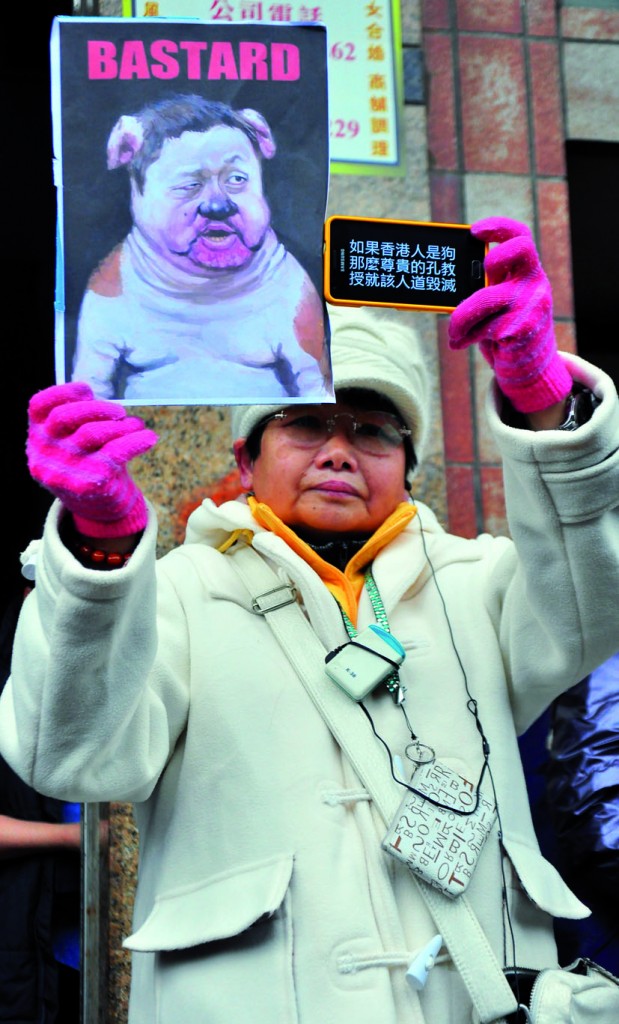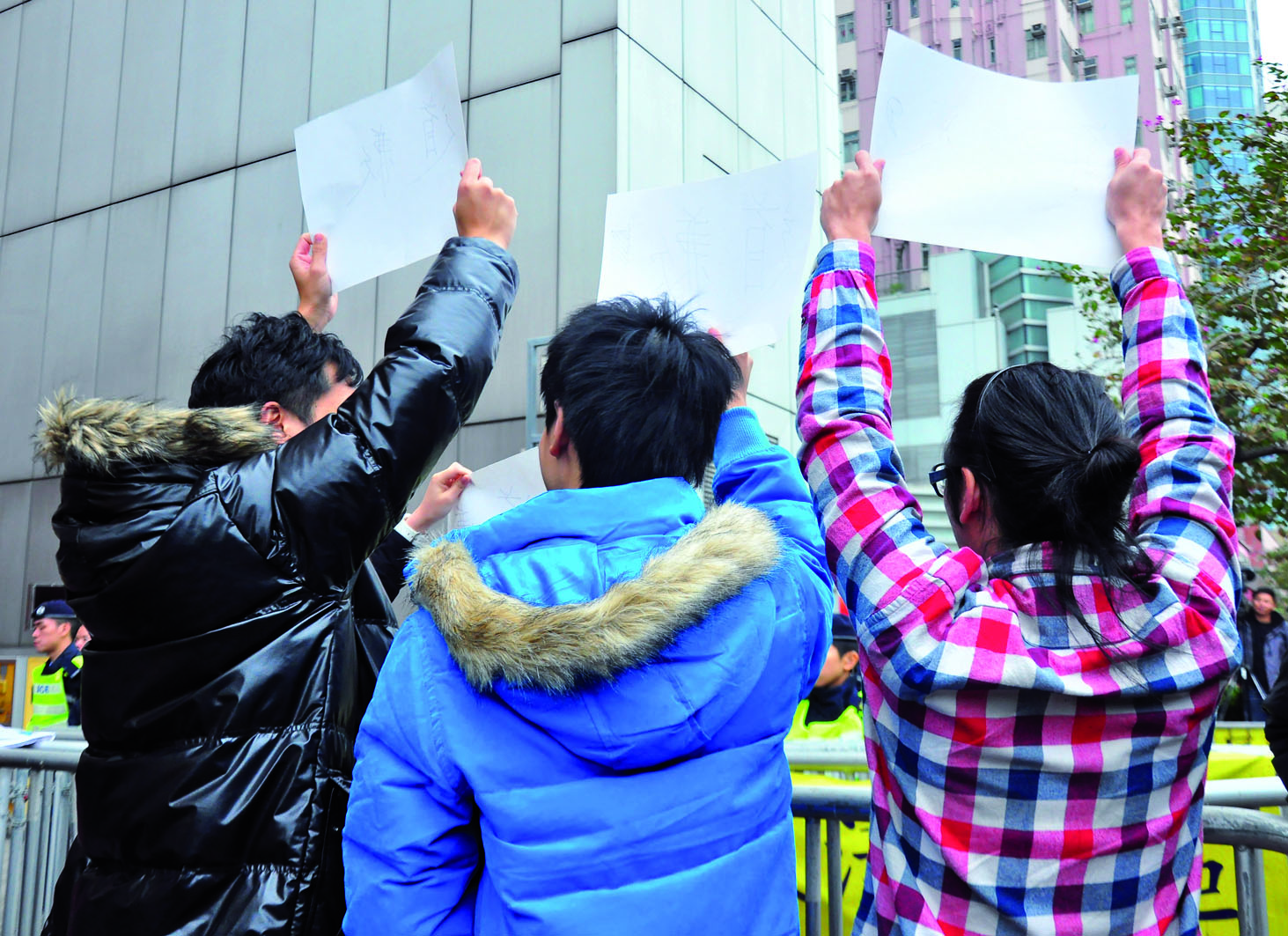Hong Kong people struggle to define and defend their mother tongue
By Stephanie Cheng, Vicki Yuen
On Lunar New Year’s Eve, when most people were eating reunion dinners with their families, more than a hundred people braved the cold and took a “walk” outside the Liaison Office of the Central People’s Government in Western.

Some brought their pet dogs, others brought dog toys and dog banners. They were not marking the Year of the Dog; they were angry and they were protesting.
Their fury was directed at Kong Qingdong, professor of Chinese studies at Peking University, who said during a webcast interview that most Hong Kong people are dogs and those who do not speak Putonghua are bastards. “Mandarin is a language. Cantonese is a dialect. Those speaking Mandarin have no duty to learn Cantonese,” Kong said on the show.
Miss Pang, a university student who had never joined such a demonstration before, stood with a homemade banner that read “Kong Qingdong apologise”. “They should respect us. Cantonese is not inferior to Mandarin,” she said.
The protest was also a first for 60-year-old Sunny Chan, who could hardly contain his fury. “Kong is the descendant of Confucius? Rubbish!” he exclaimed. “Cantonese is local culture, whereas Putonghua is only a medium for communication and exchange. They should not eliminate local culture.”
Whether Cantonese is a language or a dialect is a matter for debate. The spoken forms of regional variations of Chinese are often mutually unintelligible and even among linguists there are no universal or standardised criteria to distinguish between a language and a dialect.
Ben Au Yeung Wai-hoo, senior instructor of the Department of Chinese Language and Literature at the Chinese University of Hong Kong, believes speakers can be regarded as speaking either a language or a dialect. There is no contradiction between the two.
Au Yeung says “language” reflects a more significant and general identity in a wider context while “dialect” is more “intimate”, representing speakers as part of a smaller community. Viewed this way, Au Yeung says Cantonese may be regarded as a dialect of the Chinese language.
For the protesters outside the Central Liaison Office, the dispute over whether Cantonese is a language or a dialect is more than a linguistic or cultural issue. It is a political battle. As the linguist Max Weinreich put it, “language is a dialect with an army and navy.”
In Hong Kong, the bugle for the battle to protect Cantonese was first sounded in 2010, in response to the pro-Cantonese movement in Guangzhou.
That summer, a deputy director of the Guangzhou People’s Political Consultative Conference, proposed replacing Cantonese with Putonghua on news and variety programmes on television. He said Putonghua broadcasts would make visitors feel more welcome during the Asian Games held in the city in November.
This sparked protests and a campaign to protect Cantonese and resist what was seen as the hegemony of Putonghua.
On July 25, 2010, more than 1,000 protesters, most of them young people mobilised through the Internet, took to the streets of Guangzhou to defend their mother tongue. Their action resonated with some Hongkongers.
A week later, more than 200 people marched from Southorn Playground in Wan Chai to the government headquarters in Central. They wanted to support the Cantonese movement in Guangzhou and warn against any future encroachment on Cantonese in Hong Kong.
The Hong Kong protesters waved banners with slogans such as “different dialects; mutual respect” and “defend cultural freedom, no more thought suppression”.
Choi Suk-fong, a 52-year-old former reporter turned activist, volunteered as an organiser for the Hong Kong rally. Choi says she felt compelled to organise the protest, although she had no organisation or support behind her, because the moves to limit Cantonese in Guangzhou signalled the blatant invasion of Putonghua.
Choi says there was no solid organisation behind the demonstration. She had simply contacted Guangzhou citizens via social networking sites and created a Facebook event to call on people to support the protest.
Several Guangzhou people joined the demonstration in Hong Kong on August 1. During another demonstration in Guangzhou a week later, hundreds of people were tailed closely and some were arrested, including reporters and supporters from Hong Kong.
Choi says the campaign has strengthened the ties between people in Hong Kong and Guangzhou, who share much in language, culture and family ties. She stresses the pro-Cantonese campaign is fighting for equality and the coexistence of Cantonese and Putonghua rather than trying to oppose the government and subvert the country.
“The invasion of language is equivalent to infringing on culture. That’s deplorable,” Choi says.
Kevin Yip Ka-wing, 20, who initiated the campaign along with Choi, says the rally was both a show of support for fellow Cantonese speakers across the border and a wake-up call for Hong Kong.
“The pro-Cantonese campaign in Hong Kong is spontaneous and it is where strength and passion are truly found,” says Yip. “Neither political parties nor other interests are involved. Everyone is a leader.”
Despite his efforts to promote the campaign, few people were interested in the rally. “People only need one excuse for not standing out. What we need to do is find a hundred reasons to persuade them,” he says.
Ip Iam-chong, who teaches cultural studies at Lingnan University, thinks the lukewarm response from the general public can be attributed to the fact that Cantonese is not prohibited in Hong Kong. Therefore, the campaign is merely symbolic and abstract.
However, Anita Poon Yuk-kang from the Department of Education Studies of the Hong Kong Baptist University thinks otherwise. While she agrees Hong Kong people are not aware of the need to defend Cantonese, she thinks they have a strong sense of identity tied to their language. Cantonese is an official spoken language in Hong Kong and we still use it in every aspect of life, she says.
Sze On-na, a secondary school teacher who also joined the pro-Cantonese Campaign in 2010, thinks there is a creeping sense that Putonghua is superior to Cantonese in Hong Kong. She refuses to draw a line between Putonghua and Cantonese and say any one of them is better but sees a need to protect Cantonese.
To Sze, doing so is to defend the freedom to use her own language to express herself. Language is related to our thinking, learning and communication, she says, and if Hongkongers give up Cantonese, they will lose their ways of expression. She does not mind learning Putonghua but is opposed to using Putonghua to teach other subjects in schools.
Sze also regards the Guangzhou experience as a warning. “Some people say if we don’t care and are not aware of it, one day we will face the same destiny. Aren’t you scared?”
In mid-December last year, the Guangdong provincial government announced new restrictions on the use of Cantonese. Starting from this month, all government meetings, classes in schools, television and radio programmes must be conducted in Putonghua. The use of Cantonese has to be approved by the government.
This proposal has reenergised the pro-Cantonese movement across Guangdong province. Pro-Cantonese pictures and slogans are all over Facebook and Twitter. But Choi, who organised the Hong Kong rally last time, says she has no plans for another campaign. She feels the time has not come yet. After all, Hong Kong people can still speak Cantonese.
When asked what is most needed in the pro-Cantonese campaign, Choi says it is manpower. “The most important thing is the awareness. We need to have a sense of crisis,” says Choi. “When there are risks, don’t tolerate them. Don’t think they are inevitable.”
“We have sowed the seeds. We have left the experience,” Choi says, hoping the younger generation will stand up to protect what they stand for.
Ng Man-kit, a secondary student, is a newcomer to the pro-Cantonese campaign. He says the younger generation should inherit the language and culture. “We are the educated people of the future and Hongkongers should unify to fight for our language,” he says.
It may be harder to mobilise people for the fight than Ng realises.
After the first rally on August 1, 2010, there was another protest organised by Choi Suk-fong in Wan Chai a month later. Only seven people turned up and four were foreigners. Cecilie Gamst Berg, a Norwegian who has lived in Hong Kong for 22 years and has been teaching Cantonese for 16 years, was one of them.
Berg spent five months learning Mandarin in mainland China before coming to Hong Kong. She did not understand Cantonese when she first came. It sounded to her like people quarrelling. But as she learnt more, she began to fall in love with it.
She thinks Cantonese is beautiful and melodious like “angels dancing on a harp”. Berg says Cantonese is more energetic and fun than Mandarin.
These days, Berg is a self-professed Cantonese “fundamentalist”. She writes blogs, uploads videos, teaches Cantonese and takes part in social campaigns.
“My life mission is to make Cantonese a world language and rule the world,” Berg proudly proclaims.
Berg also joined the pro-Cantonese protest in Guangzhou the previous month. She later uploaded a video of the event which showed the heavy police presence on the day.
Berg says she is angry and disappointed but not surprised that only three locals turned up for the second pro-Cantonese rally in Hong Kong.
“That’s my experience. Hong Kong people don’t really care about their language and culture very much,” says Berg. “They [Hong Kong people] just say they can’t help.”
She believes Hong Kong people have been taught to look down on Cantonese, because of a Confucian mentality. “This is ingrained so deeply so I am hoping to change the mindset. That’s why I’m teaching all my students Cantonese,” she says.
She adds that Cantonese cannot be a dialect because it has its own characters and grammar. It is, in fact, a language.
Berg hopes Kong Qingdong’s outburst will spur Hong Kong people to stand up to Putonghua and the mainland government. “I am going to spend the rest of my life fighting for Cantonese in every way I can and I am finding more and more outlets every day,” she says.











































